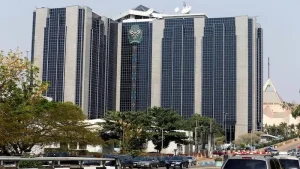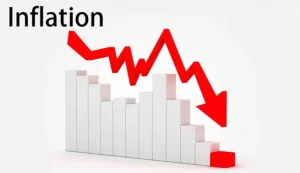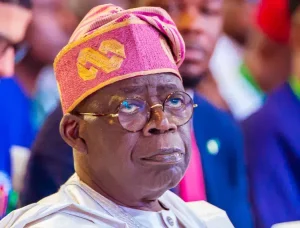CONTENTS
-
CBN HOLDS RATE AT 27.5%
-
NIGERIA’S GDP GROWS
-
INFLATION RATE DECLINES AGAIN
-
NIGERIA’S $18BN TAX LOSS
-
SENATE APPROVES TINUBU’S $21BN BORROWING PLAN
-
AFRICA’S FUEL REFINING CRISIS
-
INVEST IN YOUR CHILDREN’S FUTURE
CBN HOLDS INTEREST RATE AT 27.5%

Monetary Policy Rate at 27.5% for the third time in 2025 as the apex bank balances inflation control with economic growth.
The Central Bank of Nigeria (CBN) has once again kept the Monetary Policy Rate (MPR) steady at 27.5%, marking the third consecutive time it has maintained this benchmark rate in 2025. This decision was announced by CBN Governor Olayemi Cardoso during the conclusion of the 301st Monetary Policy Committee (MPC) meeting held in Abuja on Tuesday.
Cardoso explained that the committee’s choice to retain the rate, alongside maintaining the asymmetric corridor at +500/-100 basis points around the MPR, reflects the apex bank’s delicate balancing act between sustaining its fight against inflation and supporting the country’s fragile economic growth.
Why the Rate Hold Matters
The MPR is the central benchmark that guides lending and borrowing costs in Nigeria’s financial system. By holding the rate steady, the CBN aims to continue its tight monetary stance, which is critical to controlling Nigeria’s stubbornly high inflation. However, the MPC is also mindful that excessively high interest rates can slow down investment, weaken productivity, and strain households and businesses already grappling with rising living costs.
Governor Cardoso noted that the committee’s decision was taken in the context of broader economic reforms being implemented by the Federal Government. The MPC acknowledged that ongoing efforts to improve national security and food supply chains could help ease one of the biggest drivers of inflation, food prices.
Context: Inflation and Growth Pressures
Nigeria’s inflation has remained a major challenge, fuelled by the removal of petrol subsidies, currency devaluations, and supply chain bottlenecks affecting the cost of goods. While the tightening of monetary policy has helped stabilize the naira and slow inflation marginally in recent months, the economy still faces structural hurdles such as weak infrastructure, volatile oil revenues, and insecurity in key agricultural regions.
The MPC highlighted that easing interest rates too soon could risk undoing the progress made in stabilizing prices, while further rate hikes could deepen the cost-of-living crisis and discourage borrowing by businesses.
What’s Next?
The CBN’s rate stance will continue to influence borrowing costs for households and businesses. Commercial banks typically peg their lending rates to the MPR, meaning consumers and companies can expect credit costs to remain high in the short term.
Analysts say the CBN is likely to maintain its cautious approach until there is a significant and sustained drop in inflation. “The decision sends a clear signal that the CBN is prioritizing price stability as the foundation for long-term economic recovery,” one financial expert commented.
This latest decision follows the last rate adjustment in March 2025, when the MPR was raised from 24.75% to 27.5% as part of intensified measures to curb inflationary pressures.
As Nigeria navigates this delicate economic period, the MPC’s actions in the coming months will be closely watched by investors, businesses, and consumers alike.
NIGERIA’S GDP GROWS

Nigeria’s economy expanded 3.13% y/y in first quarter
Nigeria’s economy recorded a 3.13% year-on-year growth in the first quarter of 2025, according to the National Bureau of Statistics (NBS). This marks a notable improvement from the 2.27% growth posted in the same period last year. However, the figure fell short of analysts’ expectations, with a poll forecasting a higher expansion rate of 4.9%.
The growth data follows the long-awaited rebasing of Nigeria’s Gross Domestic Product (GDP), a technical revision that updates the base year from 2010 to 2019. Rebasing is done to more accurately reflect the structural changes and emerging trends in the economy. With this revision, Nigeria’s GDP rose to ₦372.82 trillion (approximately $243.7 billion), showing a more robust and inclusive representation of economic activity.
Statistician-General Adeyemi Adeniran, speaking at a press briefing in Abuja, noted that the growth was largely driven by the services sector, which expanded by 4.33% and contributed 57.15% to the overall GDP. He highlighted that the rebased GDP now includes rapidly growing sectors previously underrepresented, such as e-commerce, fintech, shipping and ports, arts and culture, tourism, and the creative economy.
Oil production during the quarter averaged 1.6 million barrels per day (mbpd), slightly higher than the 1.57 mbpd recorded in the same period in 2024. Despite this marginal gain, the oil sector remains vulnerable to global price fluctuations and domestic security challenges.
Adeniran explained that the rebasing exercise involved not only updating the reference year but also incorporating new methodologies and structural changes that reflect Nigeria’s evolving economy. The last rebasing occurred in 2014 and significantly altered the perception of Nigeria’s economy, making it the largest in Africa at the time, surpassing South Africa. However, since then, the country has faced economic headwinds, including multiple currency devaluations, inflation, and a weakening fiscal position.
Under President Bola Tinubu’s administration, there were high hopes that sweeping reforms, such as the removal of petrol subsidies and liberalization of the foreign exchange market, would unlock growth. While these reforms were praised by international observers and financial institutions, they have also sparked Nigeria’s worst cost-of-living crisis in a generation. As a result, the gains from reform have yet to translate into the strong, inclusive growth that many anticipated.
The Q1 2025 GDP numbers offer a mixed picture: a sign of resilience and reform-driven restructuring, but also a reminder of the structural and social challenges that continue to weigh down Africa’s most populous nation.
INFLATION RATE DECLINES AGAIN

Headline inflation falls to 22.22% in June 2025, but food prices continue upward trend
Nigeria’s inflation rate has eased for the third consecutive month, with headline inflation slowing to 22.22% in June 2025, down from 22.97% in May, according to the National Bureau of Statistics (NBS). This represents a 0.75 percentage point drop, continuing the declining trend observed since April 2025 when inflation stood at 23.71%.
The Consumer Price Index (CPI) report published by the NBS shows that the moderation in headline inflation is largely influenced by a base-year effect and a relatively improved supply of certain goods and services. However, while overall inflation is slowing, food inflation, which affects most Nigerians directly, increased to 21.97% in June, up from 21.14% in May.
The rise in food prices was mainly driven by increases in the average costs of key staples such as dried green peas, fresh pepper, white dried shrimp, crayfish, fresh meat, fresh tomatoes, plantain flour, and ground pepper.
According to the NBS, “The year-on-year food inflation rate in June 2025 stood at 21.97%, representing an 18.93 percentage point decrease from the 40.87% recorded in June 2024.” The sharp drop on an annual basis was mostly due to a change in the base year for calculations.
On a month-on-month basis, however, food prices climbed 3.25%, higher than the 2.19% recorded in May. This month-to-month increase was attributed to the accelerating costs of various food items across the country.
Regional differences also remained significant. Year-on-year food inflation was highest in Borno (47.40%), Ebonyi (30.62%), and Bayelsa (28.64%), while Katsina (6.21%), Adamawa (10.90%), and Sokoto (15.25%) recorded the slowest rises.
On a month-on-month basis, food inflation in Enugu (11.90%), Kwara (9.97%), and Rivers (9.88%) led the spike, whereas Borno (-7.63%), Sokoto (-6.43%), and Bayelsa (-6.34%) saw actual price decreases.
The contrasting trends between headline and food inflation suggest that while monetary tightening by the Central Bank may be moderating general inflation, food insecurity and supply chain pressures remain persistent, especially in conflict-affected or agriculturally vulnerable regions.
As Nigeria continues to grapple with the effects of currency devaluation and subsidy removals, containing food inflation will remain a critical concern, especially for low- and middle-income households already struggling with the cost-of-living crisis.
NIGERIA’S $18BN TAX LOSS

Nigeria loses over $18 billion annually to tax avoidance and profit shifting, prompting urgent calls for reform.
Nigeria is currently losing an estimated $18 billion every year due to aggressive tax avoidance, profit shifting, and other illicit financial practices primarily carried out by multinational corporations operating within its borders. This staggering revelation was made by the Minister of State for Finance, Dr. Doris Uzoka-Anite, during a national conference on Illicit Financial Flows (IFFs) held in Abuja in July 2025.
In her keynote address, Dr. Uzoka-Anite described illicit financial flows as a “hydra-headed monster”, a complex and deeply rooted problem that includes terrorism financing, corporate tax evasion, trade mispricing, and money laundering. She emphasized that such financial practices rob Nigeria of the resources needed to fund infrastructure, education, healthcare, and other essential public services.
“Huge sums of money are being transferred out of the country under the guise of profit repatriation and tax optimization. The sad reality is that these funds could have been used to build schools, fix roads, and provide jobs,” she said.
The Minister noted that under the leadership of President Bola Tinubu, the government is shifting its economic strategy from dependency on volatile oil revenues to a more sustainable, tax-driven revenue base. This is part of a broader fiscal reform agenda aimed at building a resilient and self-reliant economy, free from overreliance on debt and foreign grants.
Also speaking at the event, the Executive Chairman of the Federal Inland Revenue Service (FIRS), Zacch Adedeji, acknowledged that multinational companies are exploiting global tax loopholes and weak domestic regulations to avoid paying their fair share of taxes. He pointed out that many of these corporations use complex profit-shifting schemes to move taxable income from Nigeria to low- or no-tax jurisdictions, significantly undermining the country’s revenue potential.
“Illicit financial flows, especially through aggressive tax avoidance, threaten the fiscal stability of the country. We are working to close these gaps through smarter systems, simplified tax processes, and aggressive taxpayer education to promote voluntary compliance,” Adedeji said.
Meanwhile, Dr. Samson Abanni, an alumnus of the School of Politics, Policy and Governance (SPPG), added a deeper political context to the tax debate. In an interview, he described the newly signed tax reform bills as potentially “as consequential as a general election.”
According to Abanni, while the private sector has already begun adjusting to the new tax landscape, state governments may have missed their chance to influence the direction of reforms and safeguard their fiscal autonomy.
“This reform is a heart surgery on the Nigerian tax system. It quietly shifts power between the federal government, states, and traditional revenue agencies. Sadly, many state actors didn’t realize how deep it cuts until it was too late,” he said.
He noted that these sweeping reforms will likely redefine Nigeria’s economic landscape for years to come, demanding greater coordination among federal and state revenue agencies and a renewed commitment to transparency and enforcement.
As Nigeria grapples with sluggish economic growth, high inflation, and declining oil revenues, curbing illicit financial flows and reforming the tax system have become critical to ensuring the country’s fiscal survival. Policymakers are increasingly aware that plugging revenue leakages and improving tax collection will not only strengthen public finances but also reduce the country’s reliance on debt.
The $18 billion in lost revenue represents a huge opportunity cost, money that could fuel job creation, infrastructure development, and social services for millions of Nigerians.
SENATE APPROVES TINUBU’S $21BN BORROWING PLAN

Nigeria has taken a bold fiscal step as the Senate approved a comprehensive external borrowing plan worth over $21 billion to drive national development over the 2025–2026 period. The approval sets the stage for a wide range of capital and human development projects across the country.
Funding Breakdown
- $21.19 billion in foreign loans
- €4 billion in European credit lines
- ¥15 billion in Japanese yen-based loans
- A $65 million grant
- Up to $2 billion in foreign-currency instruments within the local bond market
In addition to foreign borrowing, the government is authorized to raise more funds domestically through bonds to finance priority sectors.
Targeted Sectors
- The borrowing is not random, it is strategically tied to high-impact sectors, including:
- Infrastructure
- Agriculture and food security
- Energy and power distribution
- Digital technology and broadband access
- Affordable housing
- National security
One of the standout projects under this plan is a $3 billion allocation for the revitalization of the Eastern Rail Corridor, which will reconnect Port Harcourt to Maiduguri, supporting trade, transportation, and regional integration.
With rising inflation, slow revenue growth, and infrastructural decay across the country, Nigeria’s borrowing strategy aims to unlock new opportunities for long-term development. This kind of capital injection is expected to improve productivity, create jobs, and modernize outdated public systems.
The newly approved plan was designed to align with Nigeria’s Medium-Term Expenditure Framework (MTEF) and the 2025 budget. That means it’s not just extra borrowing; it’s part of a coordinated fiscal plan to balance growth and responsibility.
Although concerns about Nigeria’s rising debt profile remain, this borrowing plan reflects a pragmatic approach adopted by many developing nations: using external financing to drive development when domestic revenue falls short.
According to legislative sources, the loans are strictly tied to developmental outcomes and will not be used for recurring expenses. Officials believe this approach mirrors global best practices and could help steer the country toward sustainable growth if managed efficiently.
This marks one of the largest borrowing packages approved in recent years and signals a clear intention to double down on economic reform and inclusive development. The next step will involve implementing these projects transparently and efficiently, ensuring that each borrowed dollar directly improves the lives of Nigerians.
FUEL REFINING CRISIS

Africa’s $90 Billion Annual Loss
Africa continues to lose an estimated $90 billion annually due to its heavy dependence on imported refined petroleum products. According to Aliko Dangote, President/CEO of Dangote Industries, the continent imports over 120 million tonnes of refined products every year because of insufficient domestic refining capacity. This reliance on imports drains resources, exports jobs, and deepens poverty across the region.
Speaking at the West African Refined Fuel Conference in Abuja, Dangote highlighted that despite Africa producing approximately 7 million barrels of crude oil daily, it refines only 40% of its consumption, compared to over 95% in Europe and Asia. He stressed that this imbalance “exports jobs and imports poverty,” calling it a significant missed economic opportunity.
Dangote also cited commercial and structural challenges in the refining sector, including volatile exchange rates (from N156/$ at the inception of his refinery project to N1,600/$ at completion), difficulty accessing crude at competitive terms, high port charges, and fragmented fuel standards across African countries. He emphasized the need for harmonized regulations to foster regional trade and efficiency.
West Africa’s Refining Gap
The Chief Executive of the Nigerian Midstream and Downstream Petroleum Regulatory Authority (NMDPRA), Farouk Ahmed, disclosed that 69% of petrol in West Africa is still imported. Despite the region’s refining capacity growing to 1.335 million barrels per day, local production has not yet significantly reduced reliance on external sources.
Ahmed further criticized the use of foreign pricing benchmarks that fail to capture Africa’s unique supply chain realities. He advocated for the creation of a regional price index, which would promote transparency, attract investment, and enhance energy security.
Nigeria’s Emerging Role
Nigeria is positioning itself as a potential refining and energy distribution hub for the entire West African coast. Ongoing reforms under the Petroleum Industry Act (PIA) 2021 and liberalization of the downstream sector have improved investor confidence.
Key projects such as the Dangote Refinery, ongoing rehabilitation of state-owned refineries, and better maritime infrastructure are expected to significantly boost local refining capacity.
Bayo Bashir Ojulari, GCEO of the Nigerian National Petroleum Company Limited (NNPCL), noted that Africa’s overreliance on exports of crude oil while importing refined products undermines industrialization and energy sovereignty. He called for a continental refining strategy, integrated infrastructure, and indigenous participation to retain value within Africa.
The Way Forward
Minister of State for Petroleum (Oil), Heineken Lokpobiri, reaffirmed the government’s commitment to creating an enabling environment for private refiners and marketers. He stated that Nigeria aims to become a marketing hub for refined products, leveraging partnerships with neighbouring countries to strengthen energy trade.
Both government and industry leaders agree that a coordinated regional approach, harmonized policies, and investment in refining capacity are critical for reversing the economic losses and strengthening Africa’s energy independence.
INVEST IN YOUR CHILDREN’S FUTURE

Why the School Break Is the Smartest Time to Secure Your Child’s Education with EDUMAX
The school bells may be silent for now, but this is exactly when smart parents make the loudest financial moves.
While many are focused on travel and relaxation this holiday, a growing number of Nigerian parents are using the break to get ahead, by securing their child’s educational future with EDUMAX, a flexible, goal-based education investment plan by Centrum Finance.
Why EDUMAX?
EDUMAX isn’t just a savings plan, it’s a smarter, more rewarding way to prepare for school fees, from crèche to college.
With as little as ₦50,000 to start and monthly contributions from ₦5,000, you can begin building an education fund that grows with competitive returns, all tailored to your unique financial situation.
Whether you’re saving for next term or ten years down the line, EDUMAX meets you where you are.
Why Now, During the Holidays?
This break gives you a head start. While others wait till the last minute, you can:
- Plan ahead before the fee rush begins
- Enjoy flexible monthly payments that match your budget
- Earn higher returns than traditional savings options
- Six (6) months minimum tenor.
- Relax during the holiday, knowing your money is working for you
- Get dedicated support from your own relationship manager
Don’t Just Pay Fees, Plan Them
Imagine the peace of mind that comes with knowing your child’s fees are already covered before resumption. No panic. No last-minute pressure. Just confidence, planning, and progress.
That’s the EDUMAX way.
Talk to Us Today
This holiday is the perfect time to set your EDUMAX goal. Whether you’re planning for primary school or preparing for private university, we’re here to help you secure the future, one smart step at a time.
Visit www.centrumfinanceltd.com
Call us on +234-808-888-8198
Or DM us on Instagram @centrumfinance
Your child’s future deserves more than last-minute plans.
Choose EDUMAX. Start strong. Stay ready.
SOURCES: Nariametrics, Businessday, istock images, Punch newspaper, Premium Times, Leadership News, Vanguard News, Daily Times Nigeria, Linda Ikeji’s Blog.
DISCLAIMER
This publication is produced by Centrum Finance Company Limited solely for the information of users who are expected to make their own investment decisions without undue reliance on any information or opinions contained herein. The opinions contained in the report should not be interpreted as an offer to sell, or a solicitation of any offer to buy any investment. Whilst every care has been taken in preparing this document, no responsibility or liability is accepted by any member of the Company for actions taken because of the information provided in this publication

